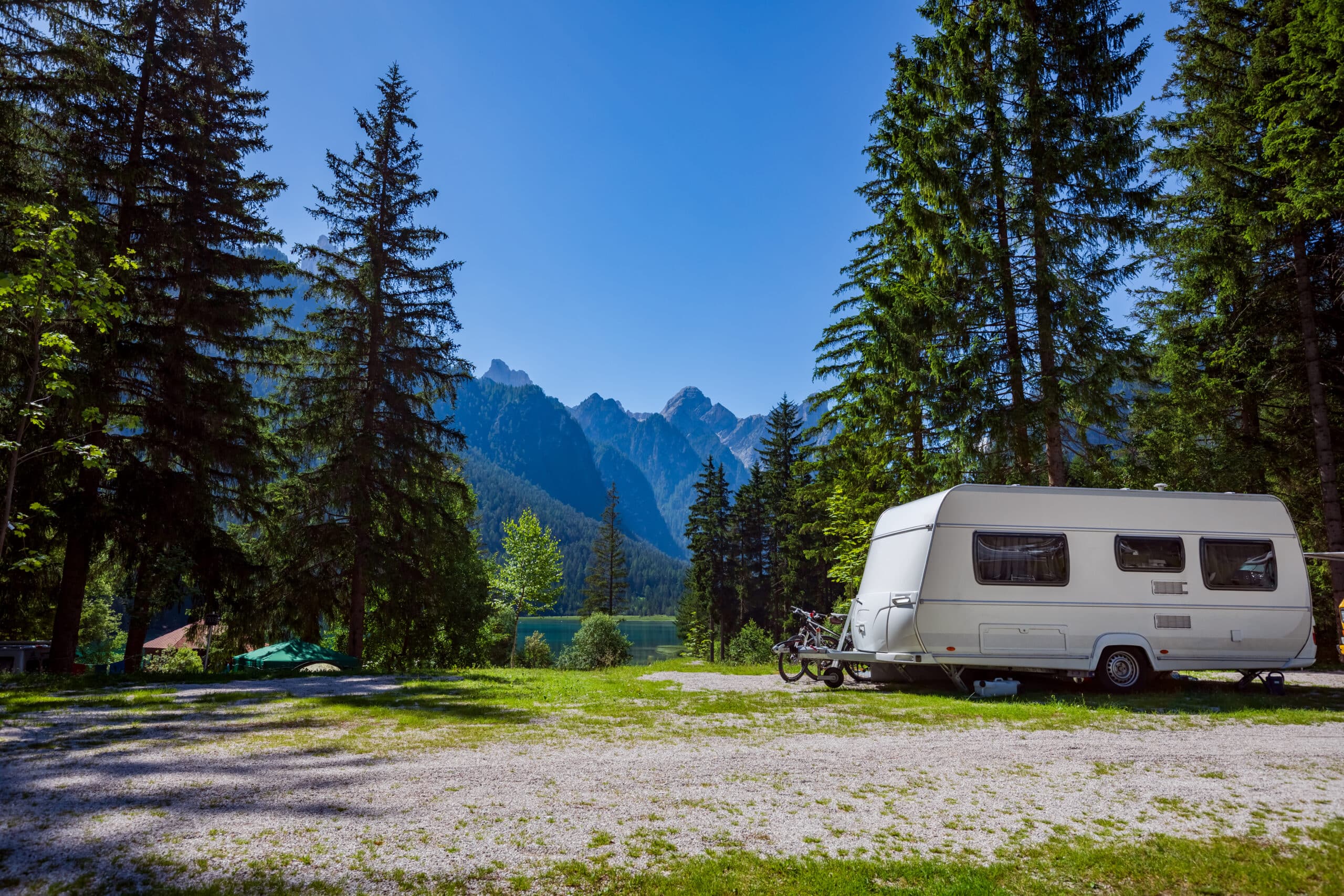Can Caravans Tip-Over in the Wind & How To Prevent It
Some of the links below are affiliate links. As an Amazon Associate, I earn from qualifying purchases. This means that, at zero cost to you, I will earn an affiliate commission if you click through the link and finalize a purchase.
Traveling is one of life’s great pleasures. Millions of people take to the road in their campers and caravans to experience the open road, find peace in nature, and look for adventure. But during high winds and inclement weather, you may be wondering: Can my caravan tip over in the wind?
Caravans can tip over in high and gale-force winds, yet it’s uncommon. Caravans are more likely to tip over in high winds while driving, but winds from a tornado or hurricane can cause stationary campers to tip. Proper anchoring and wind-blocking can prevent these situations.
The last thing you want to worry about on your trip or camping vacation is the weather, but the climate is constantly changing. When you find yourself amongst nature, it’s helpful to monitor the weather closely in areas prone to tornadoes and hurricanes. Often accompanying high winds are ground erosion and flooding, which could present more problems for you during and after the storm.
As a camper, my first concern is safety, and I bet yours is also. You want to be prepared for every situation and have a solution ready when a problem arises. Some may think that being overly prepared will ruin the spontaneity of your trip, but it’s better to be safe than sorry.
Similar to having a plan for animal encounters and unforeseen detours, you’ll want to prepare for high winds. A strong breeze might blow your tables, chairs, and awnings down the way, but an F1 tornado will cause incredible destruction.
In this article, I’ll explain how and why a caravan can tip in the wind. I’ll cover what you should do if this happens and how to prevent this circumstance. Read on to learn how to better prepare yourself for your next caravan voyage.
Can Caravans Tip-Over in the Wind?
Caravans that tip or rollover usually occur on the road due to high gusts of wind, unsecured hitches, and high rates of speed. Wind speeds over 30mph (48kph) will cause unsafe driving conditions while towing a caravan and the risk of tipping is greater. The wind will rarely cause a parked caravan to tip or overturn, but it does happen.
Parked caravans can tip over in the wind when the wind hits the broadside straight-on at over 53 miles per hour (85.3 kilometers per hour). Notably, this speed is the minimum wind speed needed to roll a caravan under these unique circumstances.
In the video below, we see an RV dealership during a tornado. These RVs are stationary in a parking lot. I am not aware if these RVs are ready to be driven off the lot or anchored down. Regardless, these heavy vehicles are no match for these strong winds.
An F1 tornado puts your caravan at a greater risk of being shifted or tipped at around 95mph (152.8kph). Per the National Weather Service, tornado speeds can reach up to over 200mph (322kph) in a category F4. In category F5, tornados can lift houses off the foundation, which means your camper is no match for this level of winds.
What To Do if Your Caravan Tips Over in the Wind
When you experience a caravan rollover, the first step is to check yourself and everyone else inside for injuries. Your safety is the most critical factor in any situation.
If your rollover occurs while driving, call emergency services immediately so police can block or direct traffic and medical personnel can attend to any injuries and transport you to the closest hospital if needed. You’ll want to contact your insurance company as soon as possible to get into the process of fixing or replacing your caravan.
The police will likely be the responsible party for calling a tow truck, but if you’ve already contacted your insurance, they may have a specific company for you to use.
When your caravan tips over at a campsite or other parked area, you’ll still want to follow the same guidelines. Check for injuries, call emergency services, and call your insurance company. You’ll also want to contact the campgrounds manager or other emergency resources. The campgrounds will also have to file a report for aid and clean-up services.
Your campground manager may be able to access resources, such as tow truck services to upright your caravan. The tow truck driver will also be able to transport the RV to a mechanic or insurance yard for inspection.
During a situation, such as a hurricane or a tornado, the Federal Emergency Management Agency (FEMA) in the United States combines and utilizes resources from across the nation to mitigate and aid in disasters. In the UK, a similar structure for emergency management helps provide temporary housing shelters, food distribution, and medical aid.
Local agencies will activate FEMA or the UK equivalent if you find yourself in a situation requiring disaster response resources. You can reschedule your vacation and replace your caravan, but you and your family and friends can’t.
How To Prevent a Caravan From Tipping Over in the Wind
The best way to plan for a caravan trip is to prepare for every situation. You can ensure a safer, happier, and more enjoyable trip at your campground or other location by taking simple steps. Safety is the number one priority, and if you find yourself in inclement or unsafe weather, leave the caravan for a more stable shelter as soon as possible.
Face the Wind
Wind speeds over 53mph (85.3kph) are powerful enough to cause the caravan to tip over if it hits the broadside straight on. Caravans are longer than they are wide, creating a risk with stabilization.
You may feel the rocking and swaying, but generally, if the wind moves around the caravan, you will not tip. However, if the wind reaches higher speeds, you increase your risks tremendously.
You can mitigate tipping or rolling from occurring by facing the wind. Park your caravan with its nose or rear pointed in the wind’s direction to reduce the effects of the wind. Pointing the shorter side of your camper toward the wind will force the wind to go around the caravan with less force.
Close Vents and Windows
When strong winds travel through a camper or caravan, it increases the amount of force applied to the opposing wall. The wind gets through open vents and windows and creates pressure on the outer and opposite inner walls, allowing it to move through the caravan instead of around it.
You force the wind to travel around instead of through your caravan by closing your windows and vents. In addition to facing your camper toward the wind, it will be more stable.
Remove Attachments
Keeping your eye on the weather is essential. If you’re aware of heavy winds headed your way, act fast and not wait until the last minute to secure your possessions. Items like patio sets, toys, and other outdoor equipment become hazards in windy weather.
Bring all of your outdoor equipment inside as best you can to avoid damage to your caravan. Remove or retract all awnings and pull in the slide-outs. The slide-outs make for a larger surface for the wind to push against, and you may find your caravan rocking or tipping. Retracting the awning will prevent it from being torn off or ripped.
Tie Down
If you have no other option or are leaving your campsite to find a more stable shelter, you can tie down the chassis and roof of your caravan to help prevent it from sliding or tipping. Most camps have anchors already installed, and you’ll need to provide tie-down straps, but this is an effective way to secure your caravan in windy weather.
Tongeren Tie Down Straps(available on Amazon) is an affordable option for campers. Use these tie-downs to secure your roof and chassis to help reduce the risk of destruction. You can fasten them to the anchors provided by the campsite. If anchors aren’t available where you’re camping, something like the Jayzod Earth Ground Anchor (also available on Amazon) can provide extra stabilization and security.
While these are excellent tips, you must always put your safety above your structure. If there is an evacuation warning, heed it with great caution and seek stable shelter immediately when the weather calls for winds that can tear off your roof or roll your caravan, imagine what it could do to you.

